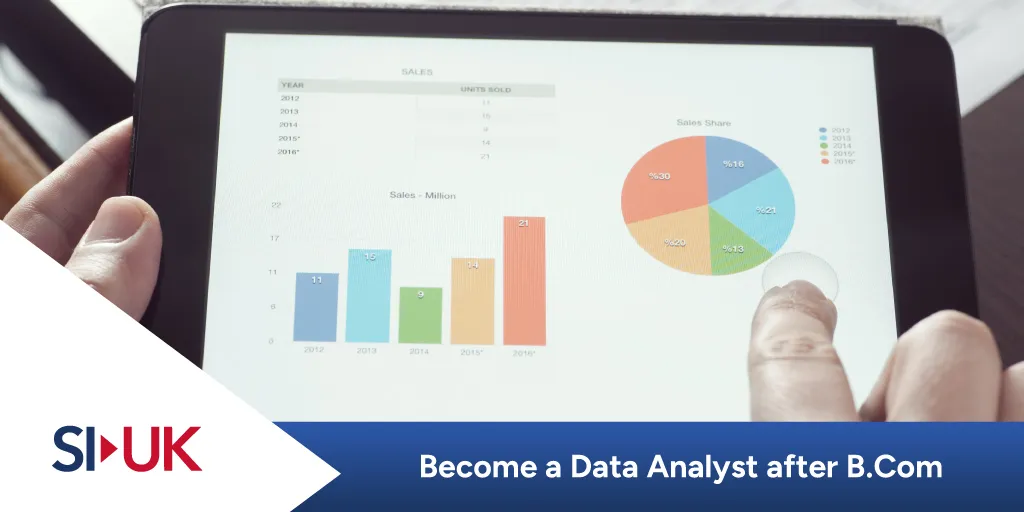Data science is one of the fastest-growing sectors in the world, having multiple uses across various organisations and businesses. Data analysis is amongst the most highly paid jobs in the world, and the role of data analysts has become crucial to business sustenance. There is a huge demand for data experts in IT and non-IT sectors such as finance, insurance, banking and e-commerce.
Graduates in commerce and business have a unique approach towards analytics because of their strong quantitative skills and understanding of business operations. Consequently, finance professionals with skills in data analysis are considered highly competitive in the industry. An additional certification in Data Analytics can, therefore, boost the career prospects of commerce graduates by improving their employability and decision-making skills.
Learn below where commerce graduates can study Advanced Data Analytics in the UK and book your free consultation with our specialist counsellors if you want to apply to study in the UK.

Becoming a Data Analyst after your BCom Degree
Do you want to become a professional data analyst? Follow the steps below to learn more about what is required and where you can study data analysis in the UK.
1. Understand the Role
Data analysts interpret data and provide insights to help businesses make informed decisions. They use statistical techniques and software tools to analyse data, identify trends, and create visualizations.
2. Acquire Necessary Skills
Since a BCom degree provides a strong foundation in business, finance, and economics, you’ll need to develop additional technical skills specific to data analysis:
- Statistical Knowledge: Learn statistics and probability, which are essential for data analysis.
- Programming Languages: Gain proficiency in programming languages commonly used in data analysis, such as Python and R.
- Data Manipulation and Analysis Tools: Familiarise yourself with tools like SQL for database querying, Excel for data manipulation, and software like SAS or SPSS.
- Data Visualization: Learn to use data visualization tools like Tableau, Power BI, or matplotlib/seaborn in Python.
- Machine Learning Basics: While not mandatory for all data analyst roles, understanding basic machine learning concepts can be beneficial.
3. Study a UK University Data Analysis Course
Postgraduate courses in data analytics in the UK can be:
- One year full-time taught masters programme
- Two-year taught masters programme with one industrial placement year
- Short term PG Diplomas and PG Certificate courses
Course modules are engaging, industry oriented and flexible. The choice is available in some universities to select modules based on students’ interests and strengths. Subject modules include Machine Learning, Econometrics, Bioinformatics, Applied Algorithms, Reasoning, Business and Internet Services.
Students can also enroll in online courses and certifications to build and validate your skills:
- Coursera, edX, Udacity: Platforms offering comprehensive courses in data science and analysis.
- Google Data Analytics Professional Certificate: A beginner-friendly programme covering data analysis tools and techniques.
- IBM Data Analyst Professional Certificate: Focuses on data analysis, visualization, and Python.
4. Practical Experience
Gain hands-on experience by working on real-world projects:
- Internships: Seek internships or part-time roles in data analysis.
- Freelance Projects: Take up freelance projects on platforms like Upwork or Fiverr.
- Personal Projects: Work on personal data analysis projects and showcase them on GitHub or a personal portfolio website.
5. Build a Portfolio
Create a portfolio that highlights your data analysis projects, showcasing your ability to handle real-world data problems and your proficiency in various tools and techniques.
6. Networking
Engage with the data analytics community:
- Join Professional Associations: Consider joining groups like the Data Science Society or the International Institute for Analytics.
- Attend Meetups and Conferences: Participate in data science and analytics meetups, webinars, and conferences.
- Online Communities: Join forums and online communities such as LinkedIn groups, Reddit, or Kaggle.
7. Tailor Your Resume and Apply for Jobs
Highlight your analytical skills, business acumen from your BCom degree, and any relevant projects or certifications on your resume. Apply for entry-level data analyst positions, emphasising your unique combination of business and technical skills.
8. Continuous Learning
Data analysis is a field that evolves rapidly. Keep updating your skills by taking advanced courses, reading industry blogs, and staying informed about the latest trends and technologies.
By following these steps, you can effectively transition from a BCom background to a data analyst role, leveraging your business knowledge and new technical skills to succeed in this data-driven field.
Best UK Universities for Data Analytics
1. University of Warwick
The University of Warwick’s Data Analytics MSc will train you in the technical skills needed to help you reach your potential in the field. Warwick’s Department of Computer Science is ranked 4th in the UK (REF 2021) and aims to enhance and revolutionise science and technology.
- Course in focus: Data Analytics (MSc)
2. London School of Economics
The MSc Data Science at the London School of Economics provides training in data science methods with an emphasis on statistics. With a well-balanced emphasis on theory and practice, students will understand the subject thoroughly and be able to apply advanced data analysis methods to investigate real world problems.
- Course in focus: MSc Data Science
3. Imperial College London
Imperial College London offers an MSc in Statistics (Data Science), which focuses on both data science and theoretical and applied statistics. You will study machine learning theory, data transformation and representation, data visualisation and how to use analytic software.
- Course in focus: MSc Statistics (Data Science)
4. University of Edinburgh
The data science MSc at Scotland’s elite University of Edinburgh focuses on informatics research, finding patterns and making data predictions. You will study topics such as machine learning, statistics and optimisation and databases and data management at the School of Informatics.
- Course in focus: Data Science MSc
5. University of Liverpool
A master's in data analytics at the University of Liverpool will teach you how to apply the accurate analysis and insights of big data to improve efficiencies across all business functions and the skills to transform business through proper decision-making and planning.
- Course in focus: Business Analytics and Big Data MSc
Eligibility Requirements for Data Analytics in the UK
Most universities in the UK require:
- 2:1 Honours degree in computer science, physics, software engineering, mathematics, economics or closely related subjects with a strong element of computing and mathematics both
- An IELTS score of 6.5 overall with no less than 5.5 in each band
Study Data Analytics in the UK
If you want to study in the UK, arrange a free consultation with SI-UK and receive help and support for your university applications and visa.



 I sincerely thank SI-UK for getting me accepted to UCL. The MSc in Urban Development and Planning is extremely competitive, but the right guidance provided by SI-UK made my dream of studying at University College London a reality. The services were exceptional from beginning to end.
I sincerely thank SI-UK for getting me accepted to UCL. The MSc in Urban Development and Planning is extremely competitive, but the right guidance provided by SI-UK made my dream of studying at University College London a reality. The services were exceptional from beginning to end. 

